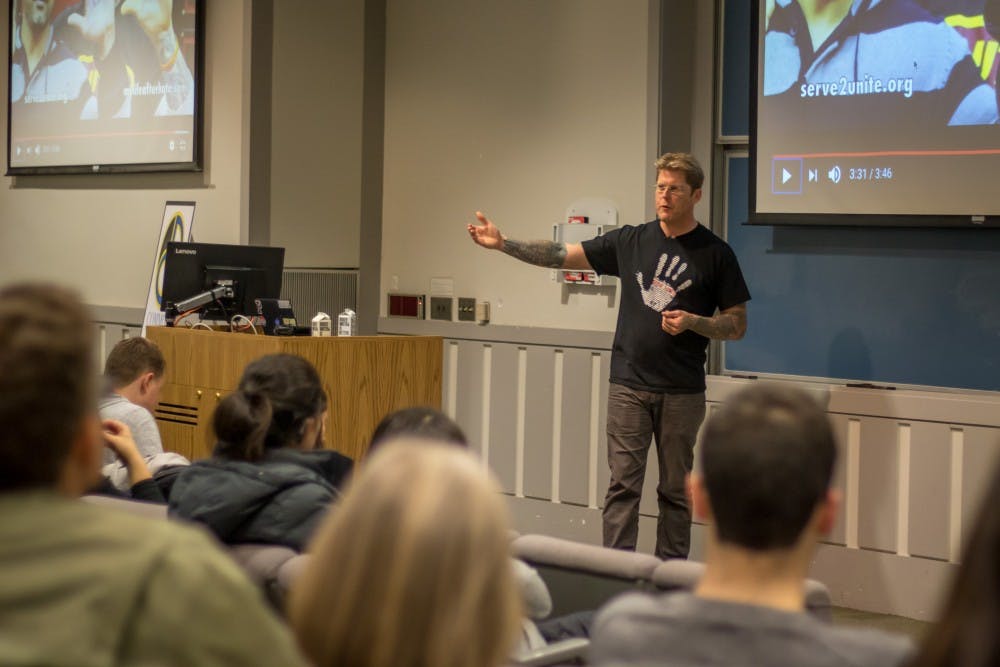
Amid a nationwide rise in hate crimes, a former neo-Nazi came to Penn on Dec. 4 to speak about kindness.
Author and activist Arno Michaelis spent his younger years in Milwaukee participating in various hate groups and calling for his peers and co-workers to join the "white power" movement. He eventually became a founding member of the Northern Hammerskins, which later joined with Hammerskin Nation — one of the largest white supremacist groups in the country.
On Monday, Michaelis spoke about that experience to a packed room of Penn students in Claudia Cohen Hall's lecture hall, expressing his regret about that period in his life and emphasizing that now more than ever, people in the United States need to show love toward those different from themselves.
While some students said the speaker's message of "unconditional love" was inspirational, others said they did not agree entirely with the idea.
The speaker event is the second one this year organized by Penn's recently established Common Party chapter, a national organization created by Marc Erlbaum after the 2016 presidential election.
Erlbaum explained on Monday that the group’s goal is to emulate the checks and balances of a democratic society by “collaborating with people who are seeing things differently.” Introducing the main speaker, he joked that it would be hard to find a former neo-Nazi and a Hasidic Jew as close as Michaelis and himself.
Michaelis began his presentation with a video of his younger self singing a song peppered with racial slurs. As the child of an alcoholic father and overworked mother, he said he had found solace in the “white power skinhead” subset of punk music.
“The lyrics were about race, and nation, and blood, and soil, and it was telling me that I was a warrior for my people — white people,” Michaelis said. “And we were under assault from everyone else because of the evil Jews.”
But after forming his own "white power skinhead" band and encouraging friends to join the "white power" movement, Michaelis said he began to see the contradictions in his actions.
“It was exhausting for me to know what I was doing was wrong, but to not have the courage to call myself out; to not answer that inner voice saying, ‘What the hell are you doing?’" he said. “I had to keep repressing that knowledge and that feeling actively, it took effort.”
Michaelis’ feelings of guilt intensified when the sitcom "Seinfeld" came on in the early 1990s. Michaelis said he enjoyed the show but was afraid to vocalize that in fear of being labeled a “race traitor” by his friends.
“It was a constant exercise in rationalizing things,” Michaelis said. “I’m rationalizing why I watch 'Seinfeld.' I’m rationalizing how I can watch a Green Bay Packers game even though I’m cheering for a bunch of white guys and black guys on the same team. I was always rationalizing how I could do things that were contradictory to this ideology I was trying to believe in.”
One night, after a friend was shot and killed in a street fight, Michaelis realized that he had to make a change. He gradually broke away from the group and turned toward activism against the "white power" movement. In 2010, he wrote a memoir titled "My Life After Hate."
College junior Nicole Rubin, a Common Party leader and a former DP reporter, said that, for her, the event reinforced the importance of listening and talking to others.
“You do have to listen to people, as frustrating as it is, and I can’t say that will be easy for me,” she said.
College freshman Whitney Elmlinger said she valued hearing about the perspective of a former neo-Nazi and white supremacist, but added that she had heard other attendees question how someone could be unconditionally kind to people with hateful views.
“He preached a lot about the idea of unconditional love and unconditional kindness to people, and his mentality now is kindness to all, no matter what their ideology is... I think a lot of people disagreed with that," she said, adding however that she did not personally share this point of view.
In a column written for the Washington Post in 2015, Michaelis discouraged people from exercising hate against Dylann Roof, a white supremacist who killed nine black parishioners in 2014 when he opened fire at a church in Charleston, N.C.
"If we seek to see him suffer, we are perpetuating the harm he has done and diminishing our own ability to bring love to the world," Michaelis wrote.
At the talk, Michaelis underscored this message. He said he believes the violence coming out of neo-Nazi movements originates in deep-seated trauma, and added that he was only able to snap out of that mindset because of the kindness that he saw from people of minority groups.
“The people who need kindness most are often the ones who least deserve it,” he said.
The Daily Pennsylvanian is an independent, student-run newspaper. Please consider making a donation to support the coverage that shapes the University. Your generosity ensures a future of strong journalism at Penn.
Donate







